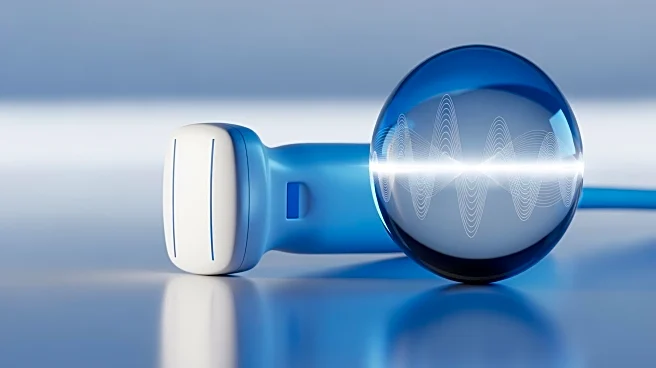What's Happening?
Exact Imaging has announced the results of its OPTIMUM clinical trial, which demonstrate the non-inferiority of its ExactVu micro-ultrasound platform compared to MRI fusion-guided biopsy for diagnosing
prostate cancer. The study, presented at the European Multidisciplinary Congress on Urological Cancers (EMUC) in Prague and published in JAMA, involved 802 biopsy-naive men with clinical suspicion of prostate cancer across 20 centers in eight countries. The trial's primary outcome was the detection of Gleason Grade Group 2 or higher cancers using ExactVu micro-ultrasonography plus systematic biopsy versus MRI/conventional ultrasonography plus systematic biopsy. Both primary and secondary outcomes were successfully achieved, indicating that ExactVu could serve as an alternative to MRI for image-guided prostate biopsy.
Why It's Important?
The findings from the OPTIMUM trial are significant as they offer a potentially more accessible and affordable diagnostic tool for prostate cancer, especially for patients with limited access to MRI. The ExactVu micro-ultrasound platform operates at a higher resolution than traditional ultrasound, allowing for precise targeting of biopsies. This technology could improve the standard of care and reduce disparities in prostate cancer diagnosis. The validation of micro-ultrasound technology through this trial marks a milestone for Exact Imaging, potentially transforming prostate cancer imaging and making high-quality diagnostics available to a broader patient population.
What's Next?
Following the successful trial results, Exact Imaging may focus on expanding the adoption of its micro-ultrasound technology in urology practices worldwide. The company could engage in further research to explore additional clinical applications, such as active surveillance, focal therapy guidance, and surgical planning. As the technology gains recognition, healthcare providers might consider integrating micro-ultrasound into their diagnostic protocols, potentially influencing insurance coverage and reimbursement policies. The broader acceptance of this technology could lead to increased competition in the imaging market, prompting advancements in other diagnostic tools.
Beyond the Headlines
The introduction of micro-ultrasound technology in prostate cancer diagnosis could have ethical implications, particularly in terms of accessibility and equity in healthcare. As the technology becomes more widespread, it may challenge existing standards and prompt discussions on the allocation of resources for diagnostic tools. Additionally, the shift towards more precise imaging techniques could influence the training and education of healthcare professionals, necessitating updates in medical curricula to incorporate new technologies. The long-term impact may include a reevaluation of diagnostic strategies and a push towards personalized medicine in oncology.









